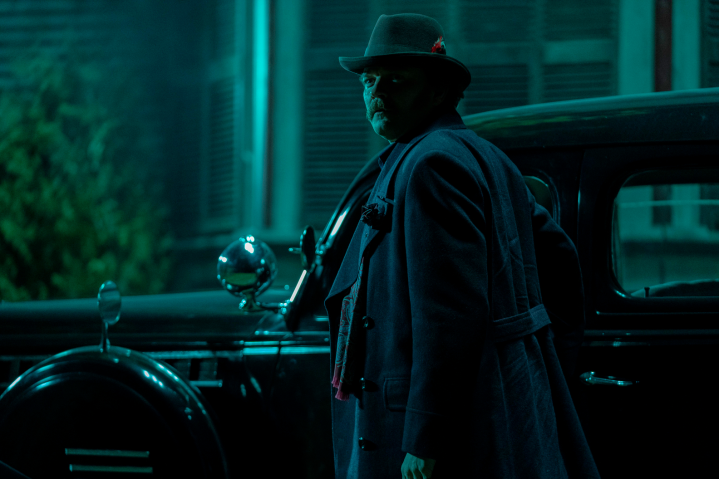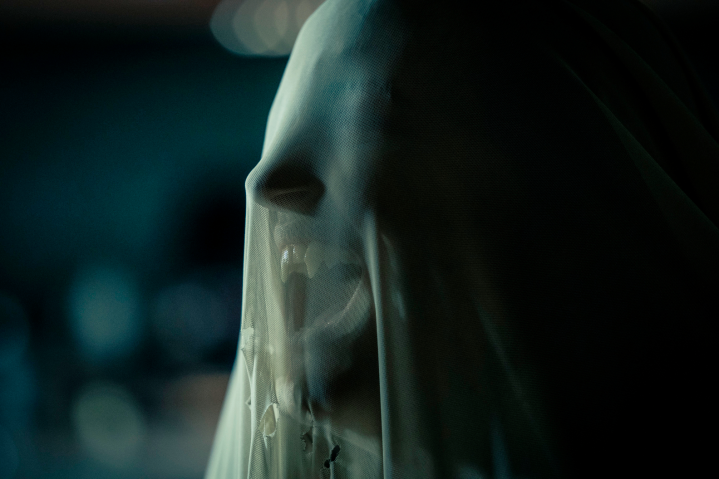“Salem's Lot will leave both horror and Stephen King fans alike yearning for a better, richer adaptation.”
- Bill Camp's standout supporting performance
- Numerous striking, gothic images throughout
- A few genuinely scary set pieces and jump scares
- A thinly sketched cast of characters
- A rushed runtime
- Not enough thematic depth
Salem’s Lot makes a classic book-to-movie mistake. It tries to do too much and ends up doing very little right. Writer-director Gary Dauberman’s clear affection for the film’s Stephen King-penned source material is clear in nearly every frame of his new, straight-to-streaming adaptation. However, he loves King’s original novel so much that he struggles to narrow its expansive, gothic American scope into a compelling, streamlined two-hour narrative. There is an obvious conflict raging at the center of Salem’s Lot, and it’s not the one taking place onscreen between a collection of small-town fighters and hungry vampires.
It is instead a battle of obligations: Dauberman’s to his source material, his own ideas, and those he feels to the modern horror audiences who will go into a movie from one of the key architectures of the Conjuring Universe expecting a very specific kind of experience. Along the way, a lot is lost. Dauberman fills his Salem’s Lot with plenty of chilling jump scares and set pieces, but little else. This is a bloodthirsty film, but one lacking enough humanity to make it interesting. It is weightless and, even worse, lacks the bleak central theme of King’s novel, one which has aged exceptionally well in the decades since Salem’s Lot was published.

Salem’s Lot doesn’t try to hide what it is. The film’s opening minutes set up in extremely blunt fashion its small-town setting and the arrival of its two hungry strangers, an immortal vampire referred to only as Mr. Barlow (Alexander Ward) and his human familiar, Richard Straker (a hammy Pilou Asbæk). From there, Salem’s Lot abruptly switches to the point of view of Ben Mears (Lewis Pullman), a writer who has moved back to his childhood hometown of Jerusalem’s Lot, Maine, to conduct some “research” for his next book. Shortly after he arrives in town, he makes friends with Matthew Burke (Bill Camp), an observant elementary schoolteacher, and Susan Norton (Makenzie Leigh), a young woman dying to leave her hometown behind.
Ben and Susan’s motivations and backstories are plainly laid out in Salem’s Lot‘s first act by Dauberman, but the filmmaker doesn’t have the time to truly flesh out either character — or any of the film’s heroes and villains for that matter. He has too many ideas for Conjuring-esque jump scares and set pieces, as well as too much knotty plotting from King’s book to deal with, to give Salem’s Lot enough depth to really separate it from other, better vampire movies. Watching it, one can’t help but wonder whether a longer, deeper version was left somewhere on the cutting room floor, either by Dauberman’s own creative choices or the demands of his studio financiers.
Either way, if King’s original text feels at its best like a sorrowful portrait of a dying, all-too-familiar American town, then Dauberman’s adaptation feels more like an Etch A Sketch of one. The outlines of every character and plot beat are all clearly, graphically drawn, but Salem’s Lot lacks the patience to fill any of them in enough to make them matter. That puts a lot of responsibility on the film’s performers to do the work that Dauberman’s script doesn’t, but most of the actors feel stranded here playing broadly sketched archetypes. Only Bill Camp, one of the most extraordinary character actors alive, really manages to bring much life and dimension to his character. Not only does he get many of Salem’s Lot‘s funniest lines but it’s only through his character’s clear interest in the well-being of his town that the film comes close to touching on the same themes as its source material.

For the most part, Salem’s Lot seems more interested in offering as many bloody thrills as it can. Some work better than others. A late-night attack on a young boy (Boy Kills World actor Nicholas Crovetti) in his backyard, for instance, lands with a thud because it is too dimly lit and artificially foggy for any actual tension to build before its sudden climax. This sequence marks one of the rare instances in Salem’s Lot in which Dauberman and cinematographer Michael Burgess strive for rich, shadowy visual depth and end up delivering disappointing murkiness instead. A different set piece, in which Camp’s Matt finds himself facing off against a newly turned vampire, works precisely because of how well Burgess and co. light the character’s home.
In this section, Matt’s open doorways suddenly feel like portals into black, vacuous spaces in which monsters could very well be lurking around every corner. This turns out to be one of many visual ideas that Dauberman pulls off exceptionally well in Salem’s Lot. For all of its flaws, it is crafted with a colorful, playful eye, and there are more than a few images — like that of a cloaked vampire standing ominously in front of a movie projector’s light — that are absolutely striking. If the narrative groundwork laid beneath them were stronger, they might even have had the potential to become iconic.

There is ultimately too little going on under the surface of Salem’s Lot for it to leave much of a lasting impression. It is immediately forgettable, and there isn’t enough of the same, palpable pain over the agonizingly slow death of America’s small towns in it that is present in King’s original work. It’s a fun, zero-calorie thriller that clearly has a lot of love for the vampire-horror subgenre, but its bite is barely sharp enough to pierce flesh, let alone draw blood.
Salem’s Lot begins streaming Thursday, October 3, exclusively on Max.




